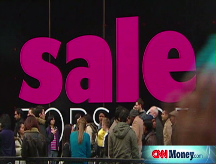Dollar rises on weak European data
A flurry of negative reports from the euro zone drive up the greenback.
NEW YORK (CNNMoney.com) -- The dollar continued its rise against the euro Tuesday as negative economic reports punished the European currency.
But investors shouldn't necessarily label the gains as a dollar rally, according to Gareth Sylvester, senior currency strategist at HFIX. "It's really a euro loss, and the dollar is gaining by default," he said.
At 12:50 p.m. ET, the dollar was up 1.11% against the 15-nation euro, which was trading at $1.3482.
The buck sank 1.21% against the British pound, to $1.4879. Meanwhile, the Japanese yen gained 0.72% to ¥94.13.
A Tuesday report showed that December's consumer price index in the euro zone fell more than expected, to a two-year low of 1.6%. An index of service industries in the zone continued to decline.
Germany, the euro zone's largest economy, is planning a €50 billion stimulus, and Italy and Spain have reported lower-than-expected inflation levels, signaling sluggish economic conditions ahead.
In light of the weak European data, investors expect the European Central Bank will be forced to slash its key interest rate again at a meeting scheduled for next week.
The market expected the ECB to remain on hold for the next few meetings, but since European inflation is so low, economists now expect the central bank to cut interest rates by half a percentage point, Sylvester said.
As the U.S. has been "the big story" of the global economic slowdown, the dollar may have been punished while the euro enjoyed a psychological lag, Sylvester said.
"It's been in the back of our minds, because we knew euros wouldn't be untouched," he said. "Now that we've come to conclusions about the different members of the euro zone, we're seeing closer scrutiny."
The market is reacting accordingly, and the euro price "reflects the true state of the zone's economic fundamentals," he said.
The dollar's safe-haven tag remains, but Sylvester said recent gains were driven mostly by Treasurys. The U.S. government-backed securities are widely viewed as a safe investment during economic downturns. Treasurys are sold in dollars, so investors must buy the American currency in order to purchase them.
"Again, it's the dollar seeing significant demand by default, not on its own merit," he said.
Sylvester said he expects currencies' volatility levels to continue for quite some time.
"In the past few months, we've seen moves in a day that used to take a year to complete," he said. "As an investor, it depends on level of risk tolerance. If you can stomach it, the currency arena might be for you."
A currency should reflect the health of its country's economy, Sylvester said,
"The question to ask yourself as an investor is: Am I be confident in this country's economy turning around?" Sylvester said. "For the dollar, I wouldn't be." ![]()


